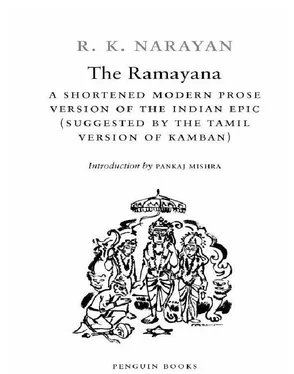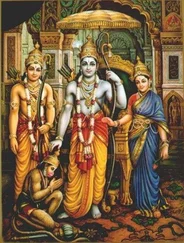Махариши Вальмики - The Ramayana
Здесь есть возможность читать онлайн «Махариши Вальмики - The Ramayana» весь текст электронной книги совершенно бесплатно (целиком полную версию без сокращений). В некоторых случаях можно слушать аудио, скачать через торрент в формате fb2 и присутствует краткое содержание. Жанр: Старинная литература, на английском языке. Описание произведения, (предисловие) а так же отзывы посетителей доступны на портале библиотеки ЛибКат.
- Название:The Ramayana
- Автор:
- Жанр:
- Год:неизвестен
- ISBN:нет данных
- Рейтинг книги:3 / 5. Голосов: 1
-
Избранное:Добавить в избранное
- Отзывы:
-
Ваша оценка:
- 60
- 1
- 2
- 3
- 4
- 5
The Ramayana: краткое содержание, описание и аннотация
Предлагаем к чтению аннотацию, описание, краткое содержание или предисловие (зависит от того, что написал сам автор книги «The Ramayana»). Если вы не нашли необходимую информацию о книге — напишите в комментариях, мы постараемся отыскать её.
The Ramayana — читать онлайн бесплатно полную книгу (весь текст) целиком
Ниже представлен текст книги, разбитый по страницам. Система сохранения места последней прочитанной страницы, позволяет с удобством читать онлайн бесплатно книгу «The Ramayana», без необходимости каждый раз заново искать на чём Вы остановились. Поставьте закладку, и сможете в любой момент перейти на страницу, на которой закончили чтение.
Интервал:
Закладка:
R. K. NARAYAN
Mysore, 1971
List of Characters
(If not otherwise indicated, the “a” is broad, as in “ah”; the “th” is a soft “t” as in “thyme”; the “u” is “oo” as in “cool”; the “i” is “ee” as in “seen”.)
DASARATHA(da sa ra’ ta): Emperor of the Kosala country with Ayodhya as its capital.

SUMANTHRA(soo man’ tra): Dasaratha’s chief minister.
VASISHTHA(va see’ shta): royal priest to Dasaratha.
VISWAMITHRA(vee swa’ mee tra): mentor to Rama and Lakshmana; in his early years a warrior and conqueror, he transformed himself by sheer will power and austerities into an adept, teacher, and saint. 3
KOONI(koo’ nee): Kaikeyi’s handmaid, whose mischief created mighty consequences.
JANAKA(ja’ na ka): King of Janaka.
SITA(see’ ta): his foster-daughter, also called JANAKI, heroine of the Ramayana (ra ma’ ya na).
SOORPANAKA(soor’ pa na ka): a demoness, sister to RAVANA (below), KARA: commander of her army of demons.
JATAYU(ja ta’ yoo): a great eagle pledged to guard the lives of Dasaratha’s children.
SAMPATHI(sam’ pa ti): Jatayu’s elder brother, deformed for challenging the sun, restored on hearing Rama’s name.
VALI(va’ lee): ruler of Kiskinda, peopled by a giant monkey race.
SUGREEVA(soo gree’ va): his brother, who engineers his death with Rama’s help.
TARA:Vali’s wife.
ANGADA(an’ ga da): Vali’s son.
HANUMAN(ha’ noo man): Sugreeva’s ally, also called ANJANEYA (an’ ja nay ya), the greatest devotee of Rama; son of the god of wind, possessing immeasurable strength, energy, and wisdom.
JAMBAVAN(jam ba’ van): one of the wise elders of Hanuman’s search party, now in the form of a bear.
THATAKA(ta’ ta ka): a demoness, daughter of SUKETHA (soo keé ta) and wife of SUNDA (soon’da).
SUBAHU(soo ba’ hoo) and MAREECHA (ma ree’ cha): her sons.

In the Tales:
GAUTAMA(gow’ ta ma): a sage who cursed his wife, AHALYA (a hal’ ya), turned to stone for infidelity.
BHAGIRATHA(ba ghee’ ra ta): who by his stubborn effort brought the Ganges down to earth in order to obtain salvation for his ancestors by washing their bones in its waters.
MAHABALI(ma ha’ ba lee): a demoniac conqueror of several worlds; to end his tyranny Vishnu incarnated as a pigmy called VAMANA (va’ ma na).
MAHAVISHNU(ma ha’ vish noo): the Supreme God, who divides himself into a trinity named Brahma, Vishnu, and Shiva for the actual functioning of the universe with all its beings.
Prologue
In keeping with the classical tradition, Kamban begins his epic with a description of the land in which the story is set. The first stanza mentions the river Sarayu, which flows through the country of Kosala. The second stanza lifts your vision skyward to observe the white fleecy clouds that drift across the sky towards the sea, and later return in dark water-laden masses to the mountaintops, where they condense and flow down the slopes in streams scouring the mountainside of its treasures of minerals and essences (“verily like a woman of pleasure gently detaching the valuables from her patron during her caresses”). The river descends with a load of merchandise such as precious stones, sandalwood, peacock feathers, and iridescent flower petals and pollen grains, carrying it through the mountains, forests, valleys, and plains of Kosala country, and, after evenly distributing the gifts, ends its career in the sea.
The poet then describes the countryside with its gardens and groves; its men and women fully occupied, their activities ranging from tilling, harvesting, and threshing to watching cock-fights of an afternoon. In the background, the perpetual groan of mills crushing sugarcane or corn, bellowing of cattle, or clamour of bullock-drawn caravans loaded with produce departing for far-off lands. Different kinds of smoke rise in the air, from kitchen chimneys, kilns, sacrificial fires, and fragrant wood burnt for incense. Different kinds of nectar—juices of sugarcane and palmyra, the dew in the heart of a chrysanthemum or lotus, or the well-stocked hive under aromatic trees—these fed the honey-bees as well as tiny birds that survived only on such nourishment; even the fishes relished this sweetness dripping and flowing into the river. At one temple or another, a festival or a wedding is always being celebrated with drums and pipes and procession. Kamban describes every sound, sight, and smell of the country, even to the extent of mentioning garbage heaps with crows and hens busily scratching and searching them.
Kosala was an extensive country and few could claim to have crossed it end to end. Ayodhya was its capital—a city of palaces, mansions, fountains, squares, and ramparts with the King’s palace dominating the landscape. The city was imposing and compared well with the fabulous city of Amravati which was Indra’s or Alkapuri of Kubera. Presiding over this capital and the country was King Dasaratha, who ruled with compassion and courage and was loved and honoured by his subjects, and was blessed in many ways. His one great sorrow in life was that he was childless.
One day he summoned his mentor at the court, Sage Vasishtha, and said to him, “I am in a sad plight. The solar dynasty is likely to end with me. I shall have no successor when I am no more. This thought torments me. Please tell me how can I remedy it.”
At this Vasishtha recollected an incident that he had witnessed through his inner vision. At one time all the gods went in a body to appeal to the Supreme God Vishnu for his help. They explained, “The ten-headed Ravana and his brothers have acquired from us extraordinary powers through austerities and prayers, and now threaten to destroy our worlds and enslave us. They go along recklessly in their career of tyranny, suppressing all virtue and goodness wherever found. Shiva is unable to help; Brahma the Creator can do very little, since the powers that Ravana and his brothers are now misusing were originally conferred by these two gods, and cannot be withdrawn by them. You alone are the Protector and should save us.” Whereupon Vishnu promised, “Ravana can be destroyed only by a human being since he never asked for protection from a human being. I shall incarnate as Dasaratha’s son, and my conch and my wheel, which I hold in each hand for certain purposes, and my couch, namely Adisesha, the Serpent, on whose coils I rest, shall be born as my brothers, and all the gods here shall take birth in the world below in a monkey clan—since Ravana has been cursed in earlier times to expect his destruction only from a monkey.”
Recollecting this episode, but without mentioning it, Vasishtha advised Dasaratha, “You must immediately arrange for the performance of a yagna. The only person who is competent to conduct such a sacrifice is Sage Rishya Sringa.”
Dasaratha asked, “Where is he? How can I bring him here?”
Vasishtha answered, “At the present time, Rishya Sringa is in our neighbouring country, Anga.”
Dasaratha exclaimed, “Oh, how fortunate! I thought he was far off in his mountain fastness.”
Читать дальшеИнтервал:
Закладка:
Похожие книги на «The Ramayana»
Представляем Вашему вниманию похожие книги на «The Ramayana» списком для выбора. Мы отобрали схожую по названию и смыслу литературу в надежде предоставить читателям больше вариантов отыскать новые, интересные, ещё непрочитанные произведения.
Обсуждение, отзывы о книге «The Ramayana» и просто собственные мнения читателей. Оставьте ваши комментарии, напишите, что Вы думаете о произведении, его смысле или главных героях. Укажите что конкретно понравилось, а что нет, и почему Вы так считаете.












